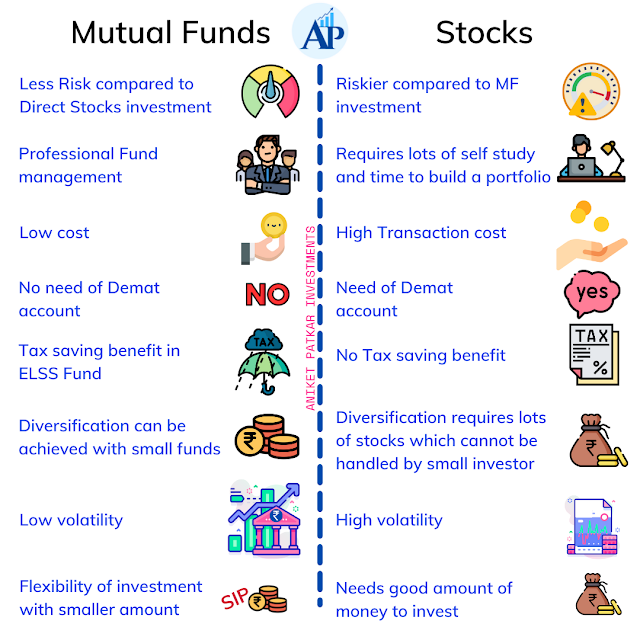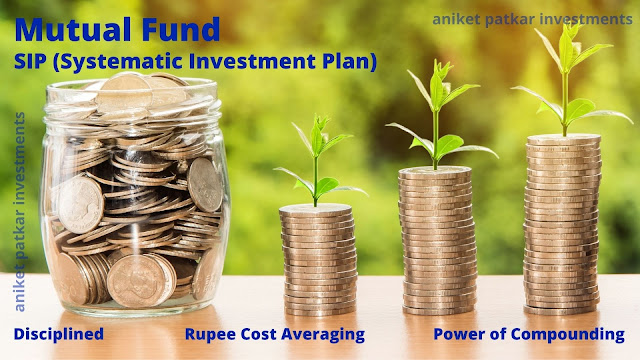Should You Invest in Stocks or Mutual Funds ?
Nowadays when stock markets are high and everyone wants to make money out of it, one question comes to everyone's mind "Should You Invest in Stocks or Mutual Funds?"
Many investors have made 40-50% returns from stocks in the last few months due to a market bull run. People can think that investing in stocks directly is more beneficial than any other investment avenue but is it true?
What is stock (equity) investment?
Investing in Stocks (equity) is like buying part ownership of a company.
What is Mutual Fund investment?
A Mutual Funds, on the other hand, is an investment led by professional managers & their research team. These fund managers invest in various options like equity (Large-cap, mid-cap, small-cap, etc.), G-Sec., Government or corporate bonds depending on the type of mutual fund.
A mutual fund comprises a pool of money collected from various investors as per the objective of a mutual fund in diversified securities.
Risk, Time & Effort
There are two ways to invest in the Stock market, one is direct and another is with mutual funds.
Direct investment in stocks is far riskier than mutual funds. For beginners, it's riskier because they generally don't know how, when, and where to invest. They pick stocks for their portfolio by watching financial news channels, listening to so-called Market gurus (influencers!) on YouTube channels, or with "tips". These multiple sources generally misguide them to make one of the common investing mistakes, "Doing Too Little study before investing". We have to make a note here that a "good" stock portfolio contains 25 to 30 stocks from diversified sectors and has a different market cap. Can anyone build such a stock portfolio with tips and news? NO.
Building such a stock portfolio requires a study of the balance sheet of different potential companies, the experience of a different market cycle, knowledge of financial terms and ratios, etc. Now, Building such a stock portfolio is not enough. We have to monitor it, maintain it over a long period of time. Monitoring this big volatile portfolio dynamically is impossible for beginner investors.
On top of that stock investors need to check how the overall economy is doing. A company can be making all the right decisions, but that doesn't stop the stock from declining if bad news hits the industry, or if a broad recession causes the entire economy to collapse. Market momentum is equally important. If the investor is not going with the hard way, there is Risk.
There is another aspect that even if investor understand all the things but he doesn't have time to take the efforts, there is a convenient way available.
The choice is straightforward and that is to invest through mutual funds. Mutual funds have the advantage of reducing the risk by diversifying a portfolio by investing in a large number of stocks with the help of the Professional management of the Fund manager and his team.
Investors still need to research for best-suited mutual funds, but there's less effort involved. You or your advisor decide what type of mutual fund you need, whether it's an index fund, sector fund, market cap (Large, mid, small-cap, multi-cap) fund, Index fund, or a debt fund. You should also look at the historical performance of a mutual fund and compare it to similar funds that track the same index or benchmark although it's not necessary that the fund will continue its historical performance but it can help us make a decision. You don't need to worry about the percentage of a particular stock in the mutual fund or when to sell them. The mutual fund manager & his team will research individual investments and decide what and when to trade.
Everyone wants superior returns from equity. But, in terms of what one does, the two paths are completely different.
Cost of Investing
An investor has to pay a small fee to mutual fund managers unlike in the case of stocks that an individual buys on his own. Active management comes with a cost but investor gets the benefit of Economies of scale. Fund managers transact on large scale because of that the transaction cost reduces drastically.
In the case of stocks, apart from the brokerage fees and security transaction tax, individual investors also have to pay the charges for a Demat account which is not needed in the case of mutual funds. The transaction costs which we discussed above are the costs of brokerage and security transaction tax.
If you have to build, monitor & dynamically manage a big portfolio at the individual level then costs might be higher. Apart from that if we add a risk factor in these costs, it can multiply exponentially for any wrong decisions made by the investor.
Overall, stocks are cheaper to invest in & Mutual funds charge a fee for the fund manager’s services but the investor's success also depends on the investor's capability to handle his investment.
Disciplined Investing
A major advantage of investing in mutual funds is discipline achieved through SIP (Systematic Investment Plan).
SIP is a method of investing systematically and consistently with a specific amount in a mutual fund. In SIP, a fixed predefined amount of money gets deducted from your account every month on a fixed date. This amount is invested in a mutual fund of your preference. Thus, you don’t have to invest yourself every time. You should start investing early through SIP so that Power of Compounding will play its role to give you more returns. You can take help from your Investment advisor or Mutual Fund Distributor to get an idea of the actual SIP amount required as per your financial goals. you can also find the SIP Calculator on different websites.
Doing so with stocks, on the other hand, is much tougher as every transaction needs to be carried out manually by the investor. Nowadays as the technology is advanced, we can invest in preselected 'Baskets of stocks' or 'smallcase' where we get an option of selected stocks for SIP. The only thing here is that the minimum SIP amount in 'smallcase' is much higher than the SIP amount in Mutual Fund.
Tax Benefits
Both Stocks and Mutual Funds attract tax on their returns (depending on how much time you hold them) but An ELSS is an Equity Linked Savings Scheme, that allows an individual or HUF a deduction from the total income of up to Rs. 1.5 lacs under Sec 80C of Income Tax Act 1961.
Diversification & Flexibility
One of the major advantages of investing in mutual funds is that one can have a diversified portfolio by investing in small and flexible amounts (beginning with as low as Rs. 100).
On the other hand, if one tries to build a diversified portfolio with stocks by buying them directly, they would need a relatively large sum of money to start.
Advisor's role
There are many PMS, Investment Advisors, Mutual Funds Distributors are available for investors to get advisory services, portfolio management services. Investors can take help of these services at nominal cost to make well-informed decisions for their long-term investments. The cost of commission or these services are always less than the cost of wrong decisions.
Linking Investments with Financial Goals
Linking your investments with your SMART Financial goals is important if you are investing in stocks or Mutual Fund. Without linking Goals with investment is like driving without a destination.
Conclusion
You can invest in equity markets Direct or through Mutual Funds, the quality of holdings and time spent in the markets matter more. If we have to talk about mutual funds vs stocks. Long-term investment in both stocks and Mutual Funds is good to achieve your financial goals. Embrace good financial habits and start investing. These two investment avenues have the potential to beat inflation and can help in your Retirement planning.




Post a Comment